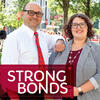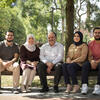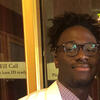IMPRINTING AN ETHOS
John Russell, CST ’86 and Dana Russell, CST ’17
When John Russell arrived at Temple in 1982, he had no way of knowing that the school would play an important role not just in shaping his career but in shaping his future children’s careers. An Upper Dublin, Pennsylvania, resident, he received a scholarship and worked in a biology lab while pursuing his degree as a commuter.
After getting his medical degree at Penn State University and completing a residency at Abington Memorial Hospital, he taught at the Lewis Katz School of Medicine. Now chair of the Family Medicine department at Abington—part of the Jefferson Health network—he often sees Temple graduates coming through his residency program.
“In medicine, you have to have a good work ethic, besides being smart and well trained,” explains John. “I see that work ethic in Temple students. There is always a certain kinship, and a sense that Temple tethers you together.” John has enjoyed watching his daughters pursue their own Temple educations.
Dana graduated from CST in 2017 and Dana’s sister Erin is currently a student at the medical school. Dana knew going in that like her father and sister, she was interested in the sciences, but rather than work in medicine, she wanted to go into education. “I enrolled in the TUteach program and teaching every semester really gave me a chance to master my craft,” she says.
More than 30 years later, Dana encountered at least one person who knew her dad while he was at Temple—now retired associate professor of instruction in biology Dan Spaeth had been a graduate student working in the same lab as her father.
One of Dana’s most formative experiences at Temple was traveling to Belize with her tropical marine biology class. She was also a Hollings scholar at the National Oceanic and Atmospheric Administration, studying coral reefs. “The government sent me to Florida to create a professional development program for teachers using natural resources as a foundation,” says Dana.
After completing her degree in biology with teaching, Dana went directly from a student teaching placement into a full-time job at New Foundations Charter High School in Philadelphia. She’s teaching and developing the school’s STEM programs, including a high-school level marine biology course. Some of her students have gone on to matriculate at Temple themselves, including in CST. On the side, she adjuncts at Temple, leading a course in coding for pre-service STEM teachers.
“The idea is to encourage more students, especially in the Philadelphia area, to get more involved in computer science and engineering. I also serve as a mentor to the current TUteach student teaching cohorts,” Dana says.
Dana is now working toward her master’s degree online at Michigan State University. And when she’s not working or studying she’s getting ready to plan her wedding to a fellow Temple alum she met during freshman orientation.
Beyond CST, another commonality in the Russell family is the desire to serve others, which John feels has only been strengthened at their shared educational institution.
“For all of us, it’s important to give back, and we like to think we passed that to our children. Being at Temple, a place that reinforces the spirit of resilience and diversity, has been a key part of that.”




